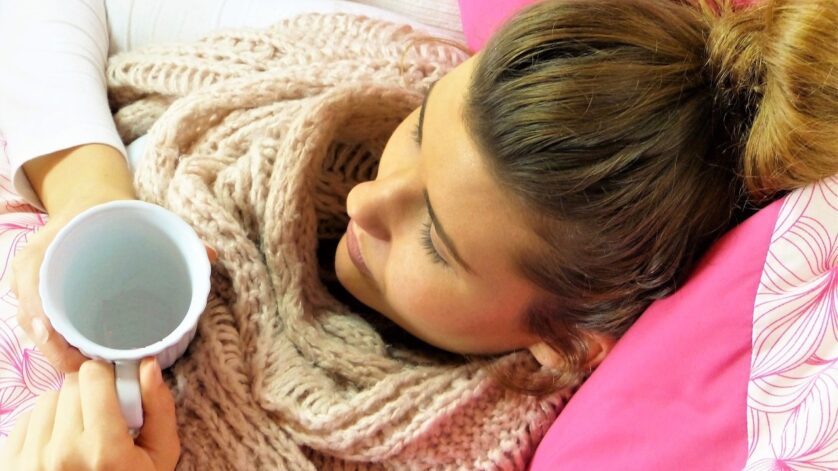When it gets closer to winter, it gets darker earlier, a little bit colder every day, and the Christmas adverts start to pop up everywhere.
How do you know? Because you’re stuck inside feeling sorry for yourself, with your temperature up and your nose red and dripping, wishing for death as you watch yet another episode of Friends.
Yup, you’ve been struck down with the common cold, and there’s nothing you can do but wait it out, right? Wrong!
Today I aim to offer you a few tips and secrets to help you on your way to recovery, so that you can get out and enjoy the snow and all that the last few weeks of the autumn term has to offer!
1. Don’t catch it in the first place
Firstly, the best way to recover from a cold is not to catch one in the first place! Wash your hands regularly, as this is the main way in which germs are transmitted to you – and avoid kissing anyone who has the sniffles if you can!
Try to keep active too, as regular exercise can reduce your chances of catching the virus. Stay positive and try to avoid stress; studies have shown that happy and upbeat people are less likely to get a cold, and stress weakens your immune system and leaves it vulnerable.
Lack of sleep and a poor diet can also leave your system open to infection, as the virus takes advantage of your poor defences.
2. Avoid It!
The best way to avoid getting ill is to eat things that support your immune system and help you send the germs packing. What your body needs are nutrients to help it fight against the invading bugs, and to repair the damage.
Dieticians suggest you stock up on your “BACE Vitamins” – that’s vitamins B, A, C and E, including folic acid – and zinc and selenium. All of these feed your immune system, and keep it functioning at its best. The best superfoods to eat to get these vitamins are fruit and vegetables, juice, Brazil nuts and lean protein sources (chicken, fish, eggs, milk).
It is also suggested you bulk out your meals with brown rice or new potatoes, to give you complex carbohydrates for uber energy. A diet like this, on top of a sufficient amount of sleep each night and a healthy amount of exercise, will make your chances of catching anything significantly less.
You should try to get plenty of sunshine too – Vitamin D protects one of the key entry points for the cold virus, your upper respiratory tracts. You can also try the natural remedy of eccinaccia, but you need to be taking this pre-emptively.
It does you no good if you start taking it after you get sick, as its needs a few weeks to build up. There are herbal remedies you can take after you catch a virus, but their effectiveness is questionable.
3. Ok, I Caught It….Help Me!!!
What can help is over the counter cold and flu remedies like Lemsip, and Paracetemol if you are in any pain or have a temperature.
I find a cup of tea with honey does wonders as well, especially if you have a sore throat. Classic comfort foods like chocolate can also help improve your mood, but don’t overdo it in a bout of self pity, as there’s very little nutritional value to them.
It can be tempting when you’re sick to live on ready meals or not eat at all, but the right foods can help you feel much better much quicker, leaving you to get on with life. Orange juice is a classic ‘superfood’, known in urban legend and proven in scientific study to chase away nasties faster than the free pizza at Freshers’ Fayre disappears.
Lots of liquid (anything but alcohol counts) is an absolute must, and try to get plenty of rest and stay warm. Chicken soup is another cliché, but it provides easily digestible protein, plenty of vital mineral goodness, and the warmth cheers you up, soothes a sore throat and helps clear out your passageways.
If you’re really bunged up, try a steaming hot shower or bath (take care not to burn yourself of course) just before bed, followed by some VapoRub, HappiNose or similar decongestant product.
Less well known as a cure for the common infliction is yogurt and probiotics; it is thought that these ‘good bacteria’ don’t get along with their cousins from the Dark Side, and actively attack them. Caffeine can also be helpful in small doses, but don’t overdo it. Try to avoid food laden with sugar and bad fat, as these may perk you up in the short term but actually clog up your systems and can prolong symptoms.
If you have the flu, and the nausea/lack of appetite that that implies, make especially sure that you’re drinking plenty. I know it can be miserable to even think about food, but at the very least have a few glasses of water, and maybe some plain toast or crackers if you can keep them down. Try to get food back into your system as soon as possible, as your body needs energy to fight the virus and to get you back on the road to recovery.
4. Keep to yourself for a while
In short, be sensible. Thankfully, most colds are of short duration and have no serious or long term effects for us students. So, make some healthy soup, wrap up warm, pop on one of your favourite films and try not to pass it on to your friends and housemates!
Got a top tip for student health/a quick recovery? Do share it with us!

